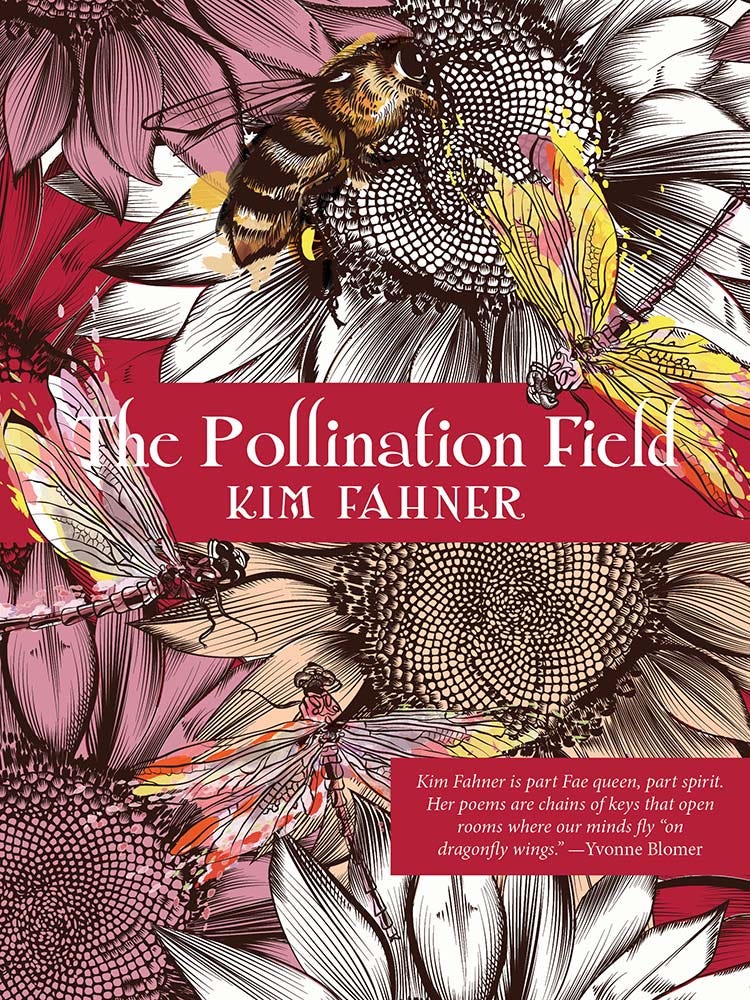The Pollination Field by Kim Fahner
A mixture of feminist fairy tale and fantastical verse
One would think that a book of poetry and prose rooted in the magic of bees would be better suited to the early summer days alive with the sound of purposeful buzzing and the sight of “ballerina spores”. But as I read The Pollination Field — Kim Fahner’s latest collection — this month, I realized that it was well-placed to bridge the warmth and enchantment of the growing season with cozier days.
(Optional add-on to enhance your reading pleasure: the playlist that she curated, and I found when visiting her website.)
These pieces — a mixture of feminist fairy tales and fantastical verse — explore the cyclical, diligent lives of pollinators or use the bee as an observer or fifth business into scenes of human life. (In such pieces, she explores how we, too, are bees — driven by innate forces and “inherited architecture” — but often forget that we are part of nature.) Throughout the collection, Fahner asks us to pause for reflection, feel hope, live fully and loudly, and face grief that may be lying dormant in the ground after a previous season’s loss.
“spaces between are where the loss lives, where grief resides…”
As autumn draws closer, I — perhaps like you — naturally turn more introspective, and so I found the theme of grief/love to be prominent in The Pollination Field; in particular, how grief/love are held deeply in “tiny things” — otherwise small, ordinary spaces, or unexpected places hiding in meadows and rabbit holes, or the seams of socks that “gather things together when nothing else will contain the brokenness of stories, nails, toes, hearts.” Or how changes are not sudden but “happen slowly, through erosion, over time, the sum of the parts is a house sliding off its foundation —too weak to hold—into a void fast-moving river, or sea”.
She balances the weight of heavy subjects through her use of beautiful imagery; indeed, her word choice stood out to me as well-placed brush strokes (too numerous for me to recount but sticking with me: a dead bee that “curled into itself like a strange semi-colon”; glaciers that “slid back and forth across continents with the ease of a lover’s hand”; the creation of a hive from stacked hexagons that “soars Fibonacci”).
Rather than create the conditions for a sombre read, though, it is instead imaginative and reflective — perfect for a fall afternoon tucked away after a long, busy summer.
About the Author
A former Poet Laureate for the City of Greater Sudbury, where she lives and writes, Kim Fahner is the author of five full-length collections of poetry, and two chapbooks. Her debut novel, The Donoghue Girl, is forthcoming in Fall 2024 (Latitude 46). A poetry editor for Consilience, an online journal that explores the spaces where the sciences and arts meet, Kim is also the First Vice-Chair of The Writers' Union of Canada (2023-25), a full member of the League of Canadian Poets, and a supporting member of the Playwrights Guild of Canada.
About the Reviewer
Bryn Robinson (she/her) lives in New Brunswick, Canada, where she uses her PhD in experimental psychology to help her support mental health research in the province. She prefers contemporary fiction, narrative non-fiction, graphic novels and poetry that is emotional, reflective, and if it can do it with humour, all the better. Bryn also writes on Campfire Notebook, where she regularly features original poetry. When not reading, she's searching for birds in the New Brunswick forests and seascapes, camera in hand.
Book Details
Publisher : Turnstone Press (Aug. 26, 2025)
Language : English
Paperback : 256 pages
ISBN : 9780888017987





Thanks for this thoughtful review. :)